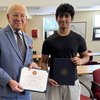Marketplace teaches life lessons
The Enterprise — Melissa Hale-Spencer
“It lets you know how a real business works,” says entrepreneur Vibha Gopal as she displays a yarn doll she made. She and her partner sold the dolls to other fifth-graders at Guilderland Elementary School who purchased the goods with pretend money they had earned through completing school tasks.
The Enterprise — Melissa Hale-Spencer
Origami expert Flynn McCallum folds 16-pointed Ninja Stars at the Guilderland Elementary School Marketplace on Friday. One of the things he learned from his study of economics is, “If a lot of people do the same things, your business won’t do as well as you think.”
The Enterprise — Melissa Hale-Spencer
Corporate kings: Guilderland fifth-graders — from left, Aaron Xu, Sean Butler, and Luca Simeone — worked together to create Minions out of rocks, which they sold to their classmates as a culmination of their economics studies. Butler wears a crown crafted of paper that doubles as a Frisbee, and was also for sale at the marketplace.
The Enterprise — Melissa Hale-Spencer
Making his mark: Gavin Spofford, wearing a crown crafted of paper that can also be used as a Frisbee, enters a raffle for a Minion, which fifth-graders created by coloring rocks. The crown was also for sale at the Guilderland Elementary School Marketplace on Friday.
The Enterprise — Melissa Hale-Spencer
Flower power: Business partners Marcella Morrison, left, and Julia Berner work so closely together, they can finish each other’s sentences. Marcella arranges a bouquet while Julia holds a container of flowers for a customer to choose from. The partners developed a rhyming marketing slogan for their flowers and sparkling putty: “Flowers brighten your day, and putty makes the stress go away.”
GUILDERLAND — Friday morning, Meghan Murphy’s fifth-grade classroom was a bustling marketplace. Kids were selling goods they had created themselves as their customers eagerly made purchases.
“It was two days of a crazy, loud atmosphere and two days of joy,” said their teacher.
The morning marketplace culminated five weeks of economics study for all of Guilderland Elementary’s fifth-graders where the kids learned about being consumers and producers in addition to earning money and paying bills.
“They have been keeping checkbooks with personal monies as well as taking on the role of entrepreneurs,” said Wendy Durocher, the school’s teacher leader for social studies. “The children have created goods to sell to others and must keep balance sheets for their businesses.”
She concluded that their study of economics over the past few weeks “has given them valuable life lessons and has also provided them the opportunity to practice shared decision-making and teamwork.”
Marketplace mavens
Murphy’s students had arranged their desks, side by side, into a large horseshoe. The young entrepreneurs stood behind the horseshoe-shaped counter, while their customers went eagerly from vendor to vendor, like bees pollinating flowers.
The steady hum added to the feeling of being inside a hive.
The first vendors to greet visitors — parents as well as kids — streaming through the classroom door were a trio of boys dressed in sporting clothes. Aaron Xu wore a Yankees T-shirt; Sean Butler, a T centered with a basketball design; and Luca Simeone sported a green sweatshirt with a Nike swoop. Sean was also wearing a paper crown he’d gotten from another entrepreneur; the folded craft doubles as a Frisbee.
The trio had formed a corporation. Other fifth-graders worked in pairs as partnerships, and a few were sole proprietors.
Aaron, Sean, and Luca were peddling Minions, inspired by the movies about them. The imaginary ancient henchmen, who evolved from single-celled organisms, destroy their villainous masters with their comic ineptitude.
“We were in the library and he thought of it,” said Aaron, crediting his friend.
Their brightly colored rocks — each of them with unique features but all of them with one or two google eyes — were neatly lined up at the boys’ stand.
The “regular ones,” the boys said, were selling for $2 each, and the “special ones” for $2.99.
Customers — kids from other classrooms — were lining up to buy the Minions.
“It’s fake money,” said Aaron, “but it gets to seem real.”
“You can save it or you can spend it,” said Luca of the money that he and his classmates had earned by such chores as doing their homework or keeping their lockers neat.
“You should save your money,” said Luca of a lesson he had learned from his weeks-long study of economics.
He elaborated, “Sometimes, if you really want something and don’t really need it, you can wait for another version or a lower price.”
Nearby, Julia Berner and Marcella Morrison were selling two different products they had made — tissue-paper flowers and bags of sparkling putty. Both were in bright colors.
“They took a long time to make,” said Marcella of the fluffy flowers. “We looked on a website to learn how to do it.”
“It took a week,” said Julia of their production time.
When the girls started their partnership, they knew they wanted to make something “with a nature theme” and “in rainbow colors,” said Marcella, “so we looked until we found these.”
They originally priced their flowers at $2 each but, when the flowers weren’t selling quickly, they dropped the price to $1.50 each. The partners also offered a discount for a purchase of three flowers, which the girls bunched into a bouquet.
“We learned about supply and demand,” said Marcella of their selling experience.
So, although they had made 60 flowers, they didn’t display them all. They had just a few out on their counter space and had the rest in a large canvas sack at their feet, which they would bring up to the counter if a customer wanted to choose a particular hue.
Several rows of plastic bags filled with bright and sparkling putty were also lined up on their counter.
The girls had developed a rhyming marketing slogan for their product: “Flowers brighten your day,” said Julia.
“And putty makes the stress go away,” Marcella completed their slogan.
Seated near the girls, Flynn McCallum meticulously folded complex shapes, based on the ancient Japanese art of origami.
He looked unperturbed by the hurly-burly around him as he concentrated on his work. Flynn learned to fold origami, he said, by watching a YouTube video and, since the colorful squares of thin paper weren’t too expensive, he thought it would be a good project for the marketplace.
Flynn developed a 16-point configuration that he called a Ninja Star.
“Ninjas are known to have sharp tools,” he said of the covert agents of feudal Japan.
For $3, customers could buy Ninja Stars with randomly chosen paper patterns that Flynn had folded in advance or, for $5, they could chose papers from his book that he would fold into customized stars as they watched.
“So far, a lot have asked for the customized,” Flynn said. Perhaps this was as much for the thrill of watching him fold as for the chance to choose their own colors and patterns.
One of the things he had learned about economics, Flynn said, is, “If a lot of people do the same thing, your business won’t do as well as you think…And, you’ve got to come up with something everyone would like.”
He also said he learned, “The stuff you sell, you have to work hard to get.”
Another partnership was formed between Vibha Gopal and Irene Montanini who, like Julia and Marcella, were selling two different products.
They peddled small dolls they had made of white yarn and “Krazy Bookz” they had printed, detailing the vocabulary for a language they invented.
For example, the English phrase “excuse me” in their language is “squash.”
The partners came up with the idea for the books, Irene said, pointing to her friend, “Because she likes to speak crazy words.”
“It’s a fun experience, seeing people get interested in stuff,” said Vibha. “It lets you learn how a real business works.” She also said, “You’re going into sixth grade; you have to have a life.”
“At first we weren’t selling anything,” said Irene. The partners originally priced the books at 75 cents, but increased the price to $2. “We had to increase because it took a lot of time,” said Vibha.
“The books have been a big hit,” said Irene.
By late Friday morning, they had sold 26 books.
The classmate who bought their 27th book opened to the first page where there was a blank for his name.
“Write your real name on the line,” advised Irene, “and then, underneath, write “aka,’ which means ‘also known as’ — and then we’ll give you a name.”
The customer did so, and then he and Irene both looked expectantly at Vibha to supply the Krazy name.
She sized up the customer for a moment and then said solemnly something that sounded like, “Coo-kaco.”
He wrote it down.
Teacher’s view
“I have become a flexible teacher,” said Meghan Murphy. A 13-year veteran of the profession, Murphy is in her third year at Guilderland, a district she says she loves. She is good at juggling, managing an interview with The Enterprise while simultaneously tending to her 5-year-old.
“Because of the budget,” Murphy said, she has taught at different schools in different grades each of her years at Guilderland.
Fifth grade is the first year that kids study economics, said Murphy, who teaches social studies; all five fifth-grade classrooms participate in the unit that culminates in the marketplace.
The students learn about money and how it is printed, about the dollar and coin system, and about basic principles like supply and demand, said Murphy.
They get a paycheck for school tasks like completing their homework, putting their chairs up at the end of the day, closing their lockers, and behaving well.
Using their “checkbooks,” they pay bills for basics like electricity.
Murphy recalled how one student commented on paying a $12 bill to Niagara Mohawk, “That’s so expensive.”
“Oh, my goodness,” she thought. “Wait until you get old.”
For the culminating marketplace, she said, “We tried to instill that, if they create their product, it creates excitement for the consumer.”
There was also a practical advantage to students’ making their own goods. “Whatever they bought would be deducted from their profit,” said Murphy.
Fourth-graders at the school get to visit the fifth-grade marketplace.
This inspires a long-simmering interest in entrepreneurship. “All the kids had their ideas on what they wanted to make,” said Murphy. “They had thought about it ahead.”
Murphy went on, “It really was all student-created and student centered. It was intrinsic with them. They knew what they wanted to do.”
Lessons unfolded as the students took on their tasks. They learned, for example, “If you’re a sole proprietor, you do all the work yourself, but then you keep all the profits,” said Murphy.
After the marketplace was over, she said, “We did a de-briefing.”
One group decided, for instance, instead of evenly splitting their profits three ways, the member who didn’t work as much wouldn’t get as much.
“We talked about what went well and what could have been improved,” said Murphy.
Students learned from others, she said. For instance, one group noticed that, in another class, the kids had put their putty in plastic eggs to sell, which seemed like a good idea.
The marketplace, Murphy concluded, reaches even students who are otherwise reticent about participating. “They come out of their shells,” she said.
Murphy described watching one boy in her class who usually keeps to himself. “He blossomed and became a salesperson,” she said. “It’s a lasting experience. They remember it.”

